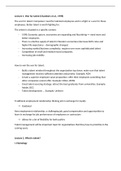Lecture 1. War for talent (Chambers et al., 1998)
The war for talent: Companies’ need for talented employees and in a fight or a war for these
employees. Better talent is worth fighting for.
The article is situated in a specific context:
- 1998: Economic upturn, economies are expanding and flourishing => need more and
better employees
- There is a decline supply of talent in Western economies (decrease birth rates and
higher life expectancy – demographic changes)
- Increasing market/business complexity, requires ever more sophisticated talent
- Competition of small and medium-sized companies.
- Increasing job mobility
How to win the war for talent:
- Build a talent mindset throughout the organization top down: make sure that talent
management receives sufficient attention and priority. Example: AON
- Create a superior employee value proposition: offer their employees something that
other companies cannot offer. Example: Hilton, BMW
- Great talent sourcing strategy: attract the best graduates from universities. Example:
Adobe, BCG
- Talent development: … Example: Unilever
Traditional employment relationship: lifelong job in exchange for loyalty
Outdated
New employment relationship: a challenging job, good compensation and opportunities to
learn in exchange for job performance of employees or contractors
Allows for a lot of flexibility for both parties
Talent management will be important topic for organizations that they have to prioritize in the
coming years.
Lecture 2. What is talent?
I. Etymology
,In ancient Greece, the term of ‘talent’ is used as a unit of weight (e.g., a talent of grain). Next it
is used as a unit of monetary. In 13th century, ‘talent’ refers to a person’s natural endowments,
dispositions, and inclinations. Next, it is used to describe a person’s mental capacity or
intelligence (talented = smart). Finally, ‘talent’ is used in term of a person (A person can be a
talent or not a talent). (Tansley, 2011; Gallardo-Gallardo et al., 2013)
II. Talent in the world of work (Tansley, 2011; Gallardo-Gallardo et al., 2013)
“It appears that talent can mean whatever a business leader or writer wants it to mean, since
everyone has his or her own idea of what the construct does and does not encompass”.
Definitions of talent are context specific. (E.g., schools, hospitals, fashion industry, software
performing need different kinds of talents).
III. Tensions in defining talent (Dries, 2013)
a. Object – Subject (Gallardo-Gallardo et al., 2013)
Object Subject
Talent is a characteristic of a person. Talent is a person himself or herself.
“She has so many talents.” “She is such a talent!” (or: high
performer, high potential, A-player)
Tansley Talent is a “complex amalgam of Talents are “those individuals who can
employees’ skills, knowledge, make a difference to organizational
cognitive ability and potential, values performance”
and work preferences”
Gallardo- Talent as a natural ability (inborn, Exclusive approach
Gallardo unique abilities that lead to superior Talent as high performers
performance, e.g., IQ, personality). +
Talent as a mastery (systematically Talent as high potential
developed knowledge and skills that =
lead to superior performance, e.g., Talent as an elite subset of an
knowledge in HR, finance, marketing). organization’s population of
+ employees
Talent as commitment (being loyal to
a position leads to a drive to Inclusive approach
contribute) Talent as all employees of an
+ organization
, Talent as a fit (being in the right
position/organization at the right
time)
b. Inclusive – Exclusive
What percentage of the working population is talented?
Exclusive Inclusive
<10% <15% ~ 100%
Exclusive
Talent designates the outstanding mastery of systematically developed abilities, skills and
knowledge in at least on field of human activity to a degree that places an individual at least
among the top 10% of age peers who are or have been active in that field or fields (Gagne,
2004)
Pareto principle: 20% of employees contribute 80% of the total value. Research has shown that
the very very good performers can deliver value that is 25 times as high as average performers.
Inclusive
A person’s recurring patterns of thoughts, feelings and behaviors that can be productively
applied (Buckingham & Vosburgh, 2001)
Ways of behaving, thinking or feeling that an individual has a natural capacity for, enjoys doing,
and which allow the individual to achieve optimal functioning while they pursue valued
outcomes. On the one hand, talent is something that you do well. And on the other hand, talent
is something that energize you, something that you do with a lot of pleasure. And the overlap
between the 2 are your strengths. (Quinlan, 2012)
, So, if you identify strengths and talents and stimulate people to use them more, you’ll
automatically energize them as well.
Core difference of exclusive and inclusive approaches (Nijs et al., 2014; van Woerkom,
Meyers, & Bakker, under review)
Interpersonal excellence (Exclusive)
We take certain people and then compare them on a certain task. Then we can select the
strongest employee for that task (Only the best is talented in comparison to other people).
Intrapersonal excellence (Inclusive)
We look at the tasks that each person has performed and by comparing these tasks, we know
when the person is at their personal best (For 1 person, we know where their strength lies and
when they are at their best) (Every person has talent, and they should be put in positions where
their strengths and talents can be optimized).
A penguin cannot become a giraffe, so just be the best penguin that you can be. – Gary
Vaynerchuk.
c. Innate – Acquired
Talents are argued to be innate because if it’s not then we would never see the phenomenal
work or performance by children that few adults can achieve.
A world-class grandmaster rule: you need to invest a min of 10,000 hours in a field to become a
world-class grandmaster in that field (10 years of at least 20 hours a week). Without training
and practice, they cannot achieve the top positions. So, talent is almost completely acquired
and we can develop it.





